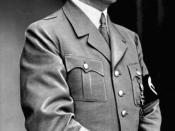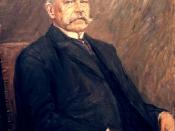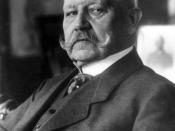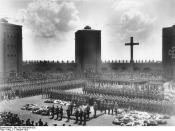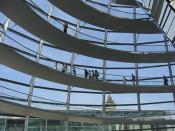Until 1925, Hindenburg's role within German politics was minor if not none, until this time he had served as one of the most important generals in the World War One. However in 1925, Hindenburg was persuaded to run for presidency by nationalist politicians after the death of President Ebert and succeeded with almost 50% of the vote. Even though Hindenburg was clearly Anti-Republican, he did not wish to return to the old style monarchy, but preferred a new authoritarian style rule which he would rule with some of his personal confidants made up of Major General Kurt von Schleicher, Oskar Hindenburg his son, General Groener and Otto Meissner, he proved to be absolutely loyal to his constitutional responsibilities and he carried out his presidential duties with absolute correctness. In April 1925, Hindenburg ran for presidency, with over 14 million votes he was able to take his new position as president of Germany, this suggested that the people of Germany wanted a strong leadership not a weak coalition government.
After the Great Depression had begun to set in the late 1920's the government began to break up and Hindenburg decided to invoke the powers of Article 48 he appointed the new chancellor Heinrich Brüning and dissolved the Reichstag. Later in 1930, during a time of political crisis, the coalition government fell apart the SPD and the DVP or Peoples Party who represented businesses in Germany were unable to agree on the size of the contribution to the fund, thus the government fell, when a new coalition government could not be found parliamentary democracy in Germany came to an end, Hindenburg's only choice was to dissolve the Reichstag and removed the deputies, replacing them. However, even this new government was more uncooperative than its predecessor and Hindenburg introduced a new system called Präsidialkabinett that was based on the system of presidential cabinets governing without party support in the Reichstag. Now Hindenburg and Brüning ruled by decree and since all government decisions needed the president's signature, Hindenburg was able to veto any parliamentary decision and Brüning governed without a parliamentary majority, deriving his authority from the powers residing in the office of President Hindenburg. The president became increasingly influenced by his military and Junker friends, Hindenburg forced the government to spend huge amounts of capital on the army and navy, driving the country into debt at the expense of the countries growing unemployment and other needs, meanwhile Brüning's deflationary policies irritated current economic policies, which can be blamed as one of the main factors for the downfall of the Republic.
Hindenburg's decision to call for the Reichstag elections in September 1930, Hindenburg inadvertently allowed the enemies of the Weimar to grow. The votes of the Nazi and Communist Parties at this time grew and the 2 parties together had obtained a huge growth spurt within the Reichstag with nearly 18% increase for the Nazi's and a 10% increase for the Communists than what the two parties had received in 1928.
After Hindenburg's first presidential term ending in April 1932 was over he ran again for office, this time with the opposition of Adolf Hitler, Hindenburg was still extremely popular and received seven million more votes than Hitler, however this can be due to the support he received form Brüning's Catholic Centre Party and the Social Democrats, this was because so many of the conservative nationalist supporters Hindenburg was used to had at this point, supported Hitler. Hindenburg was openly opposed to Hitler however Hindenburg and his supporters viewed the Nazis as a useful tool that they could use in the future, but saw Brüning as an obstacle to such a movement. Hindenburg and his followers decided to dismiss Brüning from office even though Hindenburg had just recently helped to reelect him. Schleicher, recognising Brüning's limitations and unpopularity, was convinced that the Nazi's could no longer be ignored and must be included as the popular element of a new right wing government which didn't have to rely on the SPD's help.
Hindenburg distrusted Hitler's aggressiveness in his attempts to take power, would not give Hitler the post of chancellor, Hitler and Papen who had agreed on forming a government, in which Hitler was chancellor and Papen was vice-chancellor, Papen assured Hindenburg that Hitler could be controlled. Schleicher, who was Brüning's successor, was beginning to frustrate Hindenburg who later asked for his resignation from office. On the 30th of January 1933, Hindenburg under Papen's advice appointed Hitler the new chancellor of Germany with Papen as vice chancellor, sure that he could control him to his own advantage, Hindenburg was sure that with Hitler's growing popularity equalling his own he could easily solve any future problem. Hindenburg needed important interest groups such as the major industrialists and the big landowners, who wanted a stable government, which could not be established without the Nazis. Hitler quickly demolished all restraints on his total control and he soon gained complete control of the Reichstag, and the lower legislative chamber voted him dictatorial powers on March 25th 1933. Hitler now had the powers of Article 48 and could rule by decree.
Hindenburg's political influence within German politics was great, he was able to influence the German landowners and the political parties in the Reichstag to support him such as the Catholic Centre Party in times such as his election for president in 1933. However, Hindenburg's group of confidants used Hindenburg as a puppet in some cases to further there own agendas. Hindenburg was persuaded to introduce the Nazis into German politics by his group of advisers as Schleicher suggested that Hitler should be brought into the government. Hindenburg had the power to rule by decree giving him immense power over the German political system was still unable to rule without the advice of his personal confidants, this weakness was often used against him and many of the other influences in German politics were able to use Hindenburg's power, influence and control to their own gains. Hindenburg served as a figurehead of German politics until his death on the 2nd of August 1934, the day before Hitler had decreed that the offices of Reich President, Reich Chancellor and Commander of the Armed Forces would be merged upon Hindenburg's death, Hitler thus became the Fürher of Germany.
